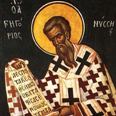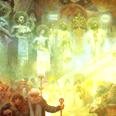by St. Gregory of Nyssa
 Our father among the saints Gregory of Nyssa was bishop of Nyssa and a prominent theologian of the fourth century. He was the younger brother of Basil the Great and friend of Gregory the Theologian. He is one of the “Cappadocian Fathers,” a title which reveals at once his birthplace in Asia Minor and the magnitude of his intellect.
Our father among the saints Gregory of Nyssa was bishop of Nyssa and a prominent theologian of the fourth century. He was the younger brother of Basil the Great and friend of Gregory the Theologian. He is one of the “Cappadocian Fathers,” a title which reveals at once his birthplace in Asia Minor and the magnitude of his intellect.
He is commemorated on January 10.
But the spiritual Lawgiver, our Lord Jesus Christ, strips the Law of its external coverings.
He discloses for us the inner meaning of the symbolic riddles.
First of all, He does not separate one man from everyone else in order to lead only him to spiritual converse with God.
 He grants this privilege equally to all, presenting the grace of priesthood as common to those who aspire to it.
He grants this privilege equally to all, presenting the grace of priesthood as common to those who aspire to it.
[…] The spiritual Lawgiver then leads the priest into the Holy of Holies, the innermost part of the sanctuary.
But this Holy of Holies is neither lifeless nor handmade. It symbolizes the hidden treasury of the heart, that is, if the heart is truly inaccessible to evil and impenetrable to wicked thoughts.
And the head He adorns with a heavenly mind, not engraving the form of letters on golden leaf (Ex 28:36) but imprinting the image of God Himself on the ruling faculty of reason.
On the hair He pours myrrh produced inwardly by the soul itself through the virtues. By means of the mystical liturgy He prepares a victim and sacrifice for the priest to offer to God, which is none other than Himself.
He who is thus led to this priesthood by the Lord puts to death the carnal mind by means of
“the sword of the Spirit, which is the word of God” (Eph 6:17).
He then enters the Holy of Holies and appeases God, offering himself as sacrifice and
“presenting his body as a living sacrifice, holy and acceptable to God” (Rom 12:1).
However, is this the obvious meaning of the Lord’s Prayer which we are interpreting? Someone will perhaps object that we are contriving these ideas and do not connect the text of the prayer to familiar things.
Let us remember, therefore, what the Lord’s Prayer has already taught us about approaching God.
Who has prepared himself to name God as his own Father with confidence? It is precisely he who is vested with such a spiritual robe described above.
[…] He enters into the Holy of Holies above the heavens which are truly in accessible and impenetrable to all profane thought.
